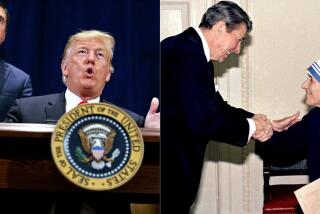Trouble in the Fast Lane
In taking his dramatic stand against Congress, President Reagan fought the wrong issue at the wrong time on the wrong battlefield. Thus the Senate voted Thursday to override Reagan’s veto of the highway construction bill despite his personal lobbying in the Capitol itself. The idea was to demonstrate that the President was in charge. But the outcome has less to do with presidential prestige and the Iran- contra affair than a whole lot of other issues and political considerations.
Today is another day, and Ronald Reagan is still President, with all the powers that the Constitution and historic tradition give a President. The Reagan record is not likely to turn on the events of April 2, 1987. The outcome does not mean that Congress will have a blank check to run amok on excessive spending. Nor will the President necessarily blink before vetoing other spending bills. The vote will not affect the President’s chances to achieve what could be the most important accomplishment of his Presidency--an arms-control agreement with the Soviet Union.
The vote does affirm what everyone already knew: that Ronald Reagan is a popular man personally, but he is a President in the twilight of his career and the leader of a party that is seeking to redefine itself for the post-Reagan era. The fortunes of GOP members of Congress no longer ride in the same saddle as the President’s. Rep. Arthur Ravenel Jr. (R-S.C.) said after voting against Reagan in the House on Tuesday: “President Reagan ain’t going to be running in 1988, but I am.”
The President is most effective when he has moral outrage on his side. The $88-billion highway act certainly contains some dubious projects, although not nearly as many as Reagan pretended, but broad support for the legislation was clear. The President has expressed outrage at “budget-busters” before, but rarely backed up his rhetoric with a real fight.
He ignored advice against picking a fight over a bill in which so many members of Congress had so much at stake. He erred in trying to persuade the 13 Republican senators already on record as voting against him that they should publicly declare that they had made a mistake. Unlike some issue of national security, the President could bring no new information to bear on the matter that would justify a senatorial flip-flop that would be beamed into millions of homes on the nightly news. The President may know AWACS and ICBMs, but the senators know their highways.
And Reagan made a mistake in fighting on Congress’ home turf. Nearly 200 years ago George Washington went before the Senate to explain a new Indian treaty and to argue for its quick ratification. Intimidated by Washington’s presence, the Senate instead sent the treaty to committee for study. Washington stomped out of the chamber saying, “This defeats every purpose of my coming here.” He never went back.
President Reagan never should have gone. Even if his veto had been sustained, the victory would not have proved what he wanted to prove.
More to Read
Get the L.A. Times Politics newsletter
Deeply reported insights into legislation, politics and policy from Sacramento, Washington and beyond. In your inbox three times per week.
You may occasionally receive promotional content from the Los Angeles Times.










